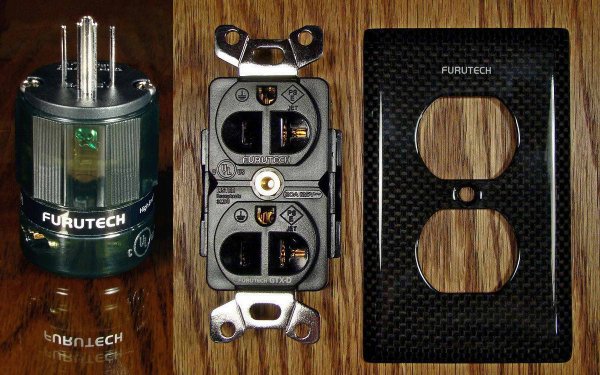What is your take on AC outlets
- Thread starter taters
- Start date
You are using an out of date browser. It may not display this or other websites correctly.
You should upgrade or use an alternative browser.
You should upgrade or use an alternative browser.
Well years ago when I wrote the Tice PB review, I received a note from a gentleman in the UK who had hard wired his system ino the wall. The upshot was a significant jump in SQ but caveat emptor. Not to mention, no electrician would do it.
Is this "what's best forum" or "who's chicken forum"
Seriously, though, it seems to me that for the best evaluation of any power line products there should be a comparison to a hard-wired component; if a big selling point of high-end outlets and cords is the quality of the connection it only makes sense to see what things sound like without those connections at all.
Things like spas, saunas, air conditioners, etc are all frequently added to existing dwellings and hard-wired in. I know they have UL-approved internal connections for this, but some enterprising, informed and capable manufacturer or hobbyist should be able to figure out a good way to do that for a power amp (after all, some are as big as spas and saunas
Is this "what's best forum" or "who's chicken forum"
Seriously, though, it seems to me that for the best evaluation of any power line products there should be a comparison to a hard-wired component; if a big selling point of high-end outlets and cords is the quality of the connection it only makes sense to see what things sound like without those connections at all.
Things like spas, saunas, air conditioners, etc are all frequently added to existing dwellings and hard-wired in. I know they have UL-approved internal connections for this, but some enterprising, informed and capable manufacturer or hobbyist should be able to figure out a good way to do that for a power amp (after all, some are as big as spas and saunas)
Yeah, but usually when things are hardwired together they are in a junction box where two or more cable enter into a junction box with strain reliefs that hold the cables tight at the point they enter the junction box. And then the wires are twisted together and wire nuts are twisted over the wires that are twisted together (Chubby Checker anyone?). For the average audiophile, that would be a nightmare. You would have to solder the wires together and not just merely twist them together. And then we would have to argue about what type of solder to use and what temperature to melt the solder with using a calibrated soldering iron. And then we would have to argue about what type of material the junction box should be made of and the plate that would be used on the junction box and how we would push the wires through the faceplate into the junction box.
Steve Williams
Site Founder, Site Co-Owner, Administrator
we did have a member here who hardwired his entire system. Claimed his system imaged perfectly from another room in the house and that he had a wonderful soundstage with his ear right up to the tweeter
Mark, you forgot an important factor. That being what power cord was to be used on the soldering iron! I'm really surprised you missed that one. I thought you had been around the block a couple of times. 
I was thinking the same thing, Steve.
Tom
I was thinking the same thing, Steve.
Tom
we did have a member here who hardwired his entire system. Claimed his system imaged perfectly from another room in the house and that he had a wonderful soundstage with his ear right up to the tweeter
Yep, I remember that guy.
Steve Williams
Site Founder, Site Co-Owner, Administrator
Frank was always good for comic relief.
Mark, I'm really talking about someone capable and knowledgable doing this specifically for evaluation of power line components. To my mind that's an area where comparative listening (at least, if not objective testing) could be easily improved.
If nothing really is very close to hard wiring, I would expect some high-end amplifier (and probably power conditioner and/or regenerator) manufacturers to build in a way to do this, as things like spas and saunas are.
Mark, I'm really talking about someone capable and knowledgable doing this specifically for evaluation of power line components. To my mind that's an area where comparative listening (at least, if not objective testing) could be easily improved.
If nothing really is very close to hard wiring, I would expect some high-end amplifier (and probably power conditioner and/or regenerator) manufacturers to build in a way to do this, as things like spas and saunas are.
And you'd still need a circuit breaker, right? Have we decided on how those contribute to the sound? I know we have fancy power conditioners, wire to connect the audiophile sockets to the breakers, fancy receptacles and face plates, and audio grade fuses, but are there audiophile breakers?Yeah, but usually when things are hardwired together they are in a junction box where two or more cable enter into a junction box with strain reliefs that hold the cables tight at the point they enter the junction box. And then the wires are twisted together and wire nuts are twisted over the wires that are twisted together (Chubby Checker anyone?). For the average audiophile, that would be a nightmare. You would have to solder the wires together and not just merely twist them together. And then we would have to argue about what type of solder to use and what temperature to melt the solder with using a calibrated soldering iron. And then we would have to argue about what type of material the junction box should be made of and the plate that would be used on the junction box and how we would push the wires through the faceplate into the junction box.
And you'd still need a circuit breaker, right? Have we decided on how those contribute to the sound? I know we have fancy power conditioners, wire to connect the audiophile sockets to the breakers, fancy receptacles and face plates, and audio grade fuses, but are there audiophile breakers?
Yes, there are. Magnetothermic residual current devices with overcurrent protection. I don't know if there are equivalents for the US:
http://www.abb.com/product/seitp329/919d46f8f0d4668fc1256f56004bce48.aspx
Yes, sir.And you'd still need a circuit breaker, right? Have we decided on how those contribute to the sound? I know we have fancy power conditioners, wire to connect the audiophile sockets to the breakers, fancy receptacles and face plates, and audio grade fuses, but are there audiophile breakers?
Tom
Frank was always good for comic relief.
Mark, I'm really talking about someone capable and knowledgable doing this specifically for evaluation of power line components. To my mind that's an area where comparative listening (at least, if not objective testing) could be easily improved.
If nothing really is very close to hard wiring, I would expect some high-end amplifier (and probably power conditioner and/or regenerator) manufacturers to build in a way to do this, as things like spas and saunas are.
It really wouldn't be hard to do, but it would take some modifications to your amp and wall outlet to do this safely. If premium power cords are really all they are cracked up to be, hard-wiring with common romex cable could make things sound worse.
It really wouldn't be hard to do, but it would take some modifications to your amp and wall outlet to do this safely. If premium power cords are really all they are cracked up to be, hard-wiring with common romex cable could make things sound worse.
I was actually thinking more of some short length of a premium power cord hard-wired to the amp, then that connected to the Romex in or near the wall. As inflexible as many high-end power cords are, most are more user-friendly than large gauge Romex. But who knows? That's what I'd be curious to find out.
Tom, that looks like complete product, panel, breakers, etc. And can you identify it for me?Yes, sir.

Tom
Gary, thank you.
Curious to know what (substitute) breakers Mike L. used in his E=T cabinet....
Tom, that looks like complete product, panel, breakers, etc. And can you identify it for me?
Gary, thank you.
Curious to know what (substitute) breakers Mike L. used in his E=T cabinet....
don't know the brand of breakers (i'm in Orlando at a convention and cannot just go look), but whatever the Equi=tech has standard is what i use.
that Isoclean panel (picture) is not UL approved and i don't know about those breakers. i do think that panel is likely the best one i know about. does that panel sound better than the one in the Equi=tech? i have no idea. it might.
Hello, whart. To answer your question, I honestly do not know. I saw it posted here a month or so ago on a thread and of course, drooled over it for a moment. That is, until I heard the price. Apparently what you are looking at is $40K worth of a breaker box. I would love to know the maker myself. Definitely some eye candy and I would love to hear what kind of difference it would make between our normal breaker boxes and the one pictured. If just swapping out my 2 outlets made the positive kind of changes they did, I could only imagine what this breaker box could do. Hubba, hubba.
Tom
Tom
I don't think that you'll find consensusThere are even 2-3 hundred $ AC outlet covers. I think that I'd enjoy $300 of music more than $300 of AC outlets or outlet covers.
However, upgrading the AC outlets to ones that grip better would improve SQ. I used the Hubbell hospital outlets with the green dot - the ones with the unplated copper terminals. I think that there's someone on this forum who would recommend another version, but I don't remember the one that was specifically recommended.
Hi guys these are the receptacles i have been using since the early 80s, they are now more than 30 years old and the grip is as they where new, cost was $131.00 for a box of 10 back then i would install them at friends houses.
PS: For 2013 this is the new kid in the bloc. wall plate - receptacle - cover - will cost you $450.00 + installation.
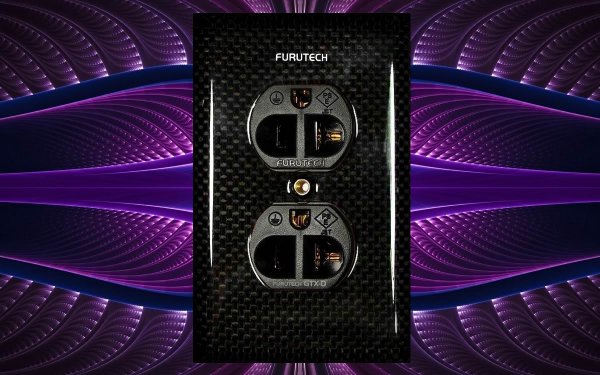
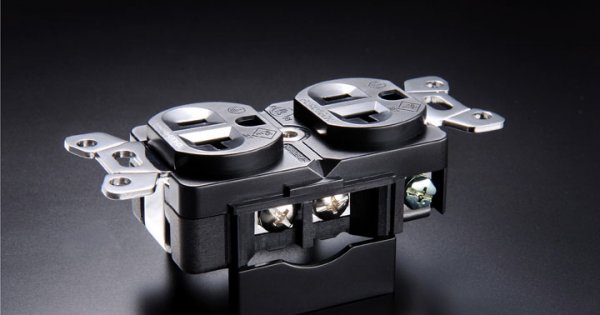
Hubbell HBL-8200HR
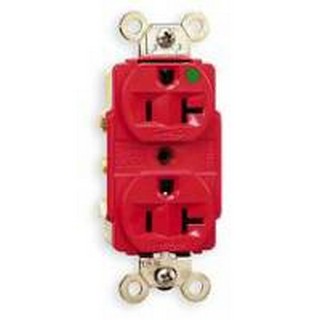
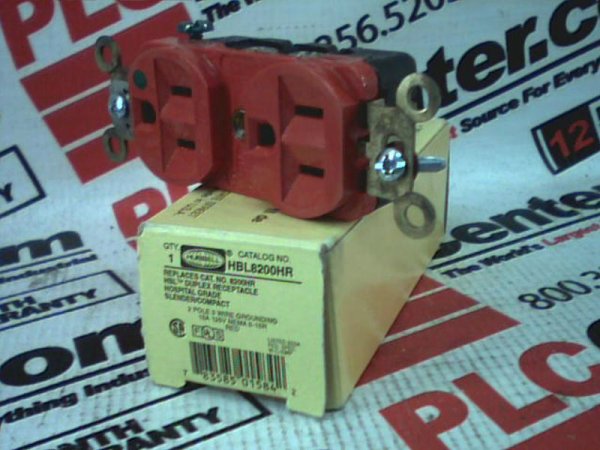
Attachments
Last edited:
Similar threads
- Replies
- 7
- Views
- 2K
- Replies
- 10
- Views
- 1K
- Replies
- 2
- Views
- 2K
- Replies
- 2
- Views
- 1K
- Replies
- 0
- Views
- 2K
| Steve Williams Site Founder | Site Owner | Administrator | Ron Resnick Site Owner | Administrator | Julian (The Fixer) Website Build | Marketing Managersing |


